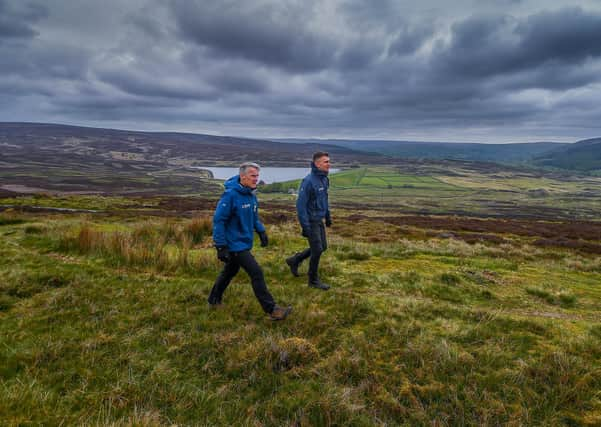Put Yorkshire’s peatlands at heart of climate plan - Graeme Willis


Like much in nature, we’ve taken peat for granted but it’s worth taking a closer look. This innocuous brown material is pretty special. Peat is formed mainly of water and organic matter from plants, especially mosses breaking down slowly in wet, cold, acidic conditions over centuries.
Over time where the land is wet enough, deep peat bogs have formed on higher ground as well as raised bogs, fens and reedbeds. These peatlands cover around 12 per cent of the UK putting us in the top 20 globally for such areas.
Advertisement
Hide AdAdvertisement
Hide AdTypically huge expanses have been drained at least since the 17th century for growing crops, grazing sheep and for managing game, as well as planting trees. We’ve also dug them up as fuel and, much more recently, to use in our gardens in the plant containers and composts we buy. But in 2020, as we face an ever-worsening climate and nature crises, we need to view peat differently.


Peatlands represent a vast semi-natural landscape of a special beauty – they support habitats with rare and endangered species. Our peatlands are the UK’s equivalent to South America’s tropical rainforests. Like rainforests, they do an amazing job in holding and releasing water to supply our drinking water – over two-thirds comes from peat-dominated catchments – and, not least, like the Amazon, they lock up carbon.
As we battle to keep cool in temperatures that have reached above 30C, spare a thought for that carbon stored in UK peat – over three billion tonnes – and more than in all the forests of the UK, France and Germany put together. That carbon is where it should be – in the ground and not the air – but it’s leaking out.
Draining, overgrazing, ploughing and cultivating – digging up and seeing peat burn unleashes millions of tonnes of carbon dioxide every year. The rate of loss hasn’t been clear or well reported until recently but the Committee on Climate Change and its scientists have now laid bare the extent of the damage in the UK: from 18.5 to 23 million tonnes of CO2 equivalent in greenhouse gases every year. It’s hard to grapple with figures like this but if we could put a stop to that, it would equate to taking a third of all cars, around 10 million, off the road, or all 500,000 trucks in the UK.
Advertisement
Hide AdAdvertisement
Hide AdSo what are we doing about it? Or rather what is the government doing about it? Planting trees is surely one solution. All the political parties were in a bidding war last general election to plant the most trees as one key way to harness nature and carbon into the bargain. The Government aims to plant 30,000 hectares a year by 2025 – that’s about 40,000 FIFA-sized football pitches. This is entirely welcome and much needed. It could, if done well, enrich our landscapes and wildlife and create new local greenspaces to enjoy for our health and escape. But trees can’t be the only answer.
If we do nothing about emissions from peat it will take all new carbon stored in all UK forests present and future to 2050 to just offset those losses each year. The simple conclusion is we need to put trees and peat at the forefront of our plans to tackle the climate emergency. Now is the time to act: we can all choose to go peat-free in our gardens.
Happily, the Government will soon publish a new Peat Strategy for England and CPRE wants this to be really ambitious with clear targets to rewet and restore peatlands in the next decade. It must deliver sustained public and private investment to restore bogs in the hills and to support a transition from dry to wet. It must also support wet farming, especially in the low-lying peatlands. There is amazing work under way to show what is possible such as the WaterWorks project exploring wet farming near Peterborough or a project in development to restore over 90 per cent of upland peat in England over the next 20 years.
This multi-million pound initiative could bring health back to huge tracts – 700,000 hectares – of our greatest northern landscapes: in the Lakes, the Pennines, the Dales and the Moors. It would lower flood risk, reverse wildlife losses and cut carbon emissions by 3.7 million tonnes a year. These projects build on years of practical experience and expertise – they may not be quite ‘shovel ready’ but they’ll help ensure we harness the potential of peat to tackle the climate emergency.
Advertisement
Hide AdAdvertisement
Hide AdGraeme Willis is Agriculture Lead at CPRE, the countryside charity
Editor’s note: first and foremost - and rarely have I written down these words with more sincerity - I hope this finds you well.
Almost certainly you are here because you value the quality and the integrity of the journalism produced by The Yorkshire Post’s journalists - almost all of which live alongside you in Yorkshire, spending the wages they earn with Yorkshire businesses - who last year took this title to the industry watchdog’s Most Trusted Newspaper in Britain accolade.
And that is why I must make an urgent request of you: as advertising revenue declines, your support becomes evermore crucial to the maintenance of the journalistic standards expected of The Yorkshire Post. If you can, safely, please buy a paper or take up a subscription. We want to continue to make you proud of Yorkshire’s National Newspaper but we are going to need your help.
Advertisement
Hide AdAdvertisement
Hide AdPostal subscription copies can be ordered by calling 0330 4030066 or by emailing [email protected]. Vouchers, to be exchanged at retail sales outlets - our newsagents need you, too - can be subscribed to by contacting subscriptions on 0330 1235950 or by visiting www.localsubsplus.co.uk where you should select The Yorkshire Post from the list of titles available.
If you want to help right now, download our tablet app from the App / Play Stores. Every contribution you make helps to provide this county with the best regional journalism in the country.
Sincerely. Thank you.
James Mitchinson
Editor